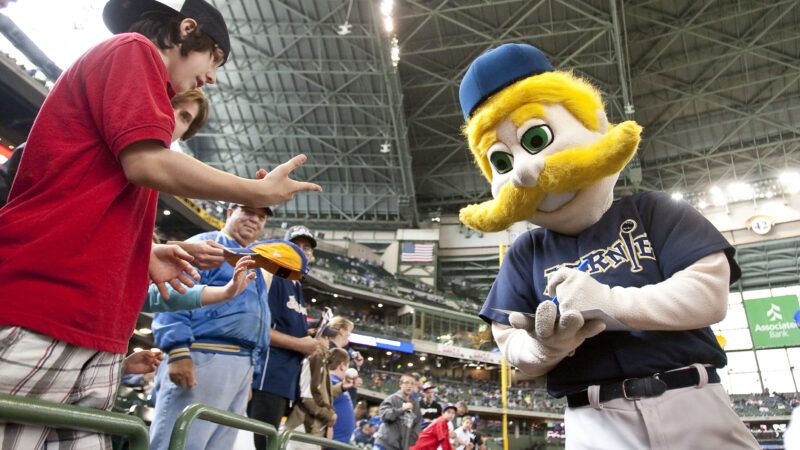Wisconsin Politicians Want To Spend $550 Million on Ballpark Subsidies the Public Opposes
Just 24 percent of self-identified Trump voters and 34 percent of self-identified Biden voters say they support a public handout for the Milwaukee Brewers' 22-year-old stadium.

Wisconsin voters might not agree on much—but a new poll finds that opposition to the use of public funds to upgrade the Milwaukee Brewers' 22-year-old ballpark cuts across ages, party lines, and more.
Only 29 percent of voters in the state favor the use of taxpayer subsidies for the stadium project, according to a survey conducted last week by Public Policy Polling (PPP). Opposition cuts across all political lines. Just 24 percent of self-identified Trump voters and 34 percent of self-identified Biden voters say they support the subsidies, while majorities of men, women, and all four age cohorts surveyed say they are opposed.
Despite the voters' feelings, Republican legislators are pushing ahead with plans to put taxpayers on the hook for more than $557 million in upgrades to American Family Field, where the Milwaukee Brewers have played since 2001. According to the Associated Press, the Wisconsin General Assembly is expected to vote on the proposal Tuesday.
American Family Field, formerly known as Miller Park, cost about $400 million to build. The public contributed nearly three-quarters of the construction cost via a new 0.1 percent sales tax in Milwaukee and several other countries surrounding the city.
State Rep. Rob Brooks (R–Saukville), who described himself in an interview last week as a "fiscal conservative," is leading the push for the new ballpark subsidy bill. "If you talk to any advertising agency, I don't know how you can have a better bang for your buck than whenever the Milwaukee Brewers appear on TV or on ESPN," Brooks told Wisconsin public radio station WTMJ.
Maybe Brooks should try talking to some economists instead. There are piles of evidence that public funding for sports stadiums does not generate economic growth or benefit the public in any way. The beneficiaries are always the private owners of the teams themselves, who would have to shell out for the construction costs of stadiums if there weren't an ample supply of local and state politicians tripping over themselves to spend other people's money on these things.
In Milwaukee, that means the beneficiary of Brooks' stadium upgrade plan is Brewers' owner Mark Attanasio, who recently bought a sizable stake in Norwich City, an English soccer team.
Most voters seem to agree that Attanasio isn't in need of a government hand-out. When asked in the PPP survey, 77 percent of voters say they believe Attanasio is "in a better position to pay for stadium improvements," while just 8 percent say taxpayers are better able to shoulder the cost. When asked how the state ought to spend $550 million, 70 percent of voters in the survey say the money should be spent on "other government priorities such as public safety, healthcare, and roads" while just 16 percent say the funding should pay for a baseball stadium.
"It is rare to find a proposed policy so disliked by voters of both parties," said Dan Adams, director of Milwaukee Works, Inc., a nonprofit that opposes the stadium subsidies and funded the PPP survey.
If Brooks and other state lawmakers don't pay attention to polls like this now, they might find themselves on the wrong side of polls that matter more, Adams said, pointing to the fact that voters in both parties said they would be less likely to support politicians who vote for the stadium subsidies. "This issue imperils incumbent politicians from both parties," Adams said in a statement to Reason. "The Brewers' bailout plan creates a ready-made primary issue for both Republicans and Democrats."


Show Comments (19)